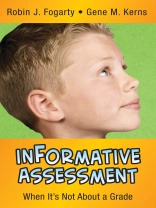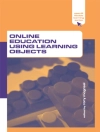Use assessment as a powerful tool to inform instruction and learning!
With practical, informed assessment techniques, you can increase your instructional effectiveness and demonstrate improvements in student learning. This research-based book, part of the In A Nutshell series, provides a succinct yet substantive discussion about formative assessments and how they impact the teaching/learning cycle. The authors present results-oriented methods, offer invaluable tips, and examine three types of in Formative assessments:
- Routine in Formative Assessments to weave into everyday instruction
- Reflective in Formative Assessments to foster self-assessment for students and teachers
- Rigorous in Formative Assessments to provide continuous tools that inform teaching practices and student learning
قائمة المحتويات
Preface
Acknowledgments
About the Authors
Opening Quote
Introduction
Part I: Purpose/Goals
Part II: ‘A Suite of Assessments’
Part III: Background/Research
Part IV: Overview of the Book and Chapter Format
1. Routine Formative Assessments: All Day, Everyday-Flow
Teachings
Scene of Scenario (for Reader′s Theater Activity)
Define, Describe, and Give Real-World Examples
Tools
Responders/’2Know!’
Lap Boards
Traffic Light Cards
Color-Coded Multiple Choice Cards
Tongue Depressors
Name Cards
Mr. Parnes′ Questions
Mr. Pete′s Questions
Techniques
Questioning Procedures
Pose Question
Allow Wait Time
Choose a Respondent Using a Random Method
Provide Some ‘Save Face’ Option
HOT Questions
Delving
Woven Questions
Rhetorical Questions
Hands Up Only to Ask a Question Policy
Cooperative Learning (Informal)
TTYPA
Shoulder
Elbow
TESA
Wait Time
Equal Opportunity to Respond
Unpacking the Language of Standards/Tests/Instructions
Tasks
Tips
2. Reflective Informative Assessments: Many Days-Conversations
Teachings
Scene or Scenario (for Reader′s Theater)
Define, Describe, and Give Real-World Examples
Tools
Agree/Disagree
People Search
Human Graph
Rubrics/Checklists (Criteria in Kid-Friendly Terms)
Journals
Little Book of Reflective Tools
Step Book
Cooperative Learning Roles and Responsibilities
Peer Tutors
PMI
Traffic Light Indicators
Student Portfolios
Blogs
Tear Share
Magic Book
Mrs. Potters′ Questions
Ms. Poindexter′s Questions
Techniques
Range Finding Questions (Prior Knowledge)
Hinge Point Questions (During Instruction)
Rubric Development With the Class
Use of Benchmark Papers
Descriptive Feedback
Reflective Questions (Metacognition)
Peer Assessment (Peer Editing)
Cooperative Learning
Interactive Conversations
Teacher – Student/Student – Teacher
Student – Student
Student – Self
Email Buddies
Comments That Reference Criteria, Instead of Grades
‘There Are _ Wrong. Find Which Ones.’
Focused Marking (One Aspect of Element)
Grading: Omit Zeros, Omit Averages, Require Students to Do Missing Assignments
Tasks
Tips
3. Rigorous Informative Assessments: Some Days – Philosophical Shift
Teachings
Scene or Scenario (for Reader′s Theater)
Define, Describe, and Give Real-World Examples
Tools
Performance Tasks
Performance Checklists
Performance Rubrics
Grading Practices
Informative Grading
Informative Grade Book
Gray Area About Grade Books
Standards-Based Grade Books
Color-Coded Grade Books
Electronic Grade Book
Electronic Test Creation Software
Techniques
HOT
Inductive
Deductive
Performance Based
Tests, Test Questions, Test Analysis
Ungraded Practice Test
Developing Test Questions
Test Questions: Fat/Skinny (or Whale/Minnow) Questions
Test and Work Analysis: Examining Student Work
Summative Assessment as Informative Assessment
Philosophical Shift, Between Formative and Summative Assessments
How Can You Use a Summative Assessment in a Formative Manner?
Data
Item Analysis
Robust Distractors
Tasks
Application Activity
Tips
4. Closure
Attribution Theory (Dweck, 2007)
Afterword
Tomlinson Summary Points
References
Index
عن المؤلف
A third-generation educator with teaching experience from elementary through the university level, in addition to K-12 administrative experience, Gene Kerns serves as vice president of training and certification for Renaissance Learning, Inc. With more than a decade of experience in leading professional development sessions, as well as taking on the role of presenter at national and international conferences, Kerns has knowledge and know-how of the adult learner. In addition, he has the experience to work across the generations with a genuine quality that is laced with anecdotes, humor, and heartfelt passion. Former clients include the New York State Unified Teachers, New Jersey Principals′ Association, Illinois Coalition of Essential Schools, and the Ministry of Education of Singapore. Kerns received his bachelor’s and master′s degrees from Longwood College in Virginia. He also holds a doctor of education degree from the University of Delaware, with an emphasis in education leadership. Informative Assessment: When It’s Not About a Grade is Kerns′ first publication.












